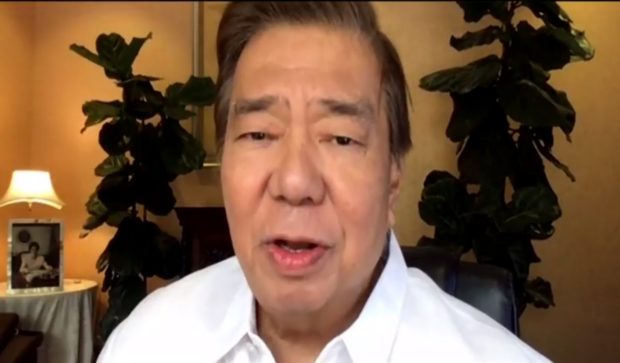MANILA, Philippines — Senate Minority Leader Franklin Drilon has called for immediate passage of a bill to amend the Retail Liberalization Act, saying it would remove the “steam that fuels the train change of charter” in the House of Representatives.
According to Drilon, the proposed amendment to the Retail Liberalization Act aims to further ease foreign restrictions by removing investment categories and setting a general minimum paid-up capital investment equivalent to US$300,000.
“Immediate passage of this law will remove the steam that powers the Cha-cha train in the House of Representatives,” Drilon said during Tuesday’s plenum as the Senate tackled Bill 1840 of the Senate.
“By amending the Foreign Investment Act (FIA), further easing restrictions on retail trade and amending the Civil Service Act, the Philippines will generate up to $30 billion in foreign direct investment (FDI ) per year.”
“We are all being bombarded with questions about the so-called Economic Charter Amendment. Well, we don’t need to be bothered by such discussions because we can immediately improve the investment climate,” he added.
The House is currently holding plenary debates on proposed economic amendments to the 1987 Constitution.
The lower house is attacking the resolution n° 2 of the two houses tabled by the president Lord Allan Velasco.
Under Resolution No. 2 of both Houses, the phrase “unless otherwise provided by law” would be added to the constitutional restrictions that limit the participation of foreign investors in the governing body of entities according to their proportional share in the capital .
The same sentence would also be added to provisions stating that only Filipino citizens can control, own and/or lease public utilities, educational institutions, media companies and advertising companies in the country.
“The Cha-cha proposed to the House of Representatives simply seeks to add the phrase ‘unless otherwise provided by law’ to accommodate the so-called economic provisions of the Constitution,” Drilon pointed out.
“But what we need now to deal with the economic downturn is a concrete solution through the enactment of various economic measures such as the amendments to the Retail Trade Liberalization Act and the Civil Service Act. “, he added.
“Obstacles to Foreign Investment”
Drilon, the main author of the trade liberalization bill, said the passage of the measure “will address a number of obstacles to foreign investment”.
He noted that under the current Retail Trade Liberalization Act, companies with paid-up capital of less than US$2.5 million in peso equivalent were reserved exclusively for Philippine citizens and companies held in 100% by Filipino citizens.
The bill, he said, removes investment categories and sets a minimum paid-in capital investment equivalent to US$300,000 in Philippine pesos for overseas retailers.
Drilon went on to lament that even after more than 20 years since the Retail Liberalization Act was passed, the Philippines “still has a very poor retail investment portfolio.”
“Like an ostrich, for 66 years we have buried our heads in the sand, refusing to fully recognize that retail liberalization is not bad economic policy,” he added.
In addition, Drilon said the country continued to adhere to the same “protectionist policy” under the Retail Nationalization Act of 1954 despite the passage of the Retail Liberalization Act in 2000. .
This has resulted in the Philippines falling behind in terms of foreign investment, he pointed out.
Since the enactment of the Commercial Law, Drilon said the share of wholesale and retail trade in total net foreign direct investment (FDI) indicates that net investment inflows into the Philippines have been “very minimal” with a average annual growth of only 5%.
The Minority Leader also said that over a period of five years – from 2012 to 2016, Southeast Asian countries received an average of US$17 billion in foreign investment in the retail sector.
The Philippines’ share over the same period averaged $107 million or 0.006%, he noted.
In 2016 alone, Drilon said the Philippines only received $101 million in foreign investment in the retail sector, while Thailand had $3.2 billion; Malaysia, $2.5 billion; Indonesia, $2 billion; and Vietnam, $2 billion.
On the other hand, Singapore received more than $8 billion, which the senator said is almost more than all the other Southeast Asian economies combined.
Singapore imposes no restrictions on foreign investment in retail and enjoys a per capita income of $88,000, he said.
In 2021, there were just 46 foreign retail companies registered with the Ministry of Trade and Industry, a growth of two retailers per year since 2000, according to Drilon.
The amendment to the Retail Liberalization Act is among 11 priority actions identified by the Legislative-Executive Development Advisory Council, Drilon said.
KGA
Subscribe to our daily newsletter
Read more
Subscribe to INQUIRER PLUS to access The Philippine Daily Inquirer and over 70 titles, share up to 5 gadgets, listen to the news, download as early as 4am and share articles on social media. Call 896 6000.


